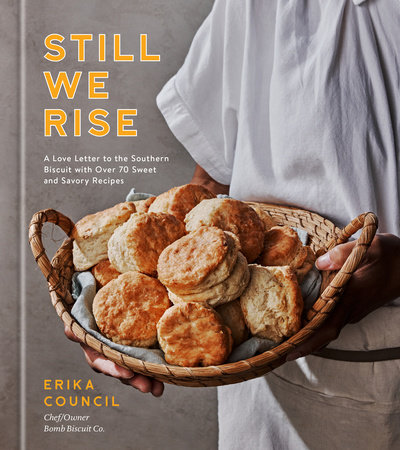IntroductionWhen I decided to write a cookbook, I had little doubt that it would be about the gospel of biscuits. They’ve long been an obsession of mine, one that matured from a family tradition, to a hobby, to a business. As the years have passed, biscuits have taken center stage in my life, such that now, while it’s still dark outside, our little biscuit bakery radiates with light and warmth from both the ovens and the people working inside. The golden glow the sun casts over the city as it rises mimics the golden-brown tops of the biscuits coming out of the oven on their trays.
Like many people in the South, I have always had biscuits nearby, but I grew up very aware of the legacy of two women’s biscuits in particular.
My paternal grandmother, Mildred Edna Cotton Council, was an icon in the culinary industry, paving the way not only for me but for many others. Born in 1929, she led an extraordinary life, one that she chronicled in her 1999 cookbook,
Mama Dip’s Kitchen, named after her beloved restaurant. The youngest of seven children, my grandma Dip was born and raised on a farm in the Chatham County area of North Carolina. She earned the nickname “Dip” due to her height; she stood a regal six feet and could reach down into the rain barrels to collect water for the kitchen when the wells ran dry. She had eight children, one being my father, William Council (who thinks he makes the best pimento cheese). And in 1976, she opened her restaurant in the college town of Chapel Hill, North Carolina, with just enough money to buy food for the breakfast service that day. As they say, the rest is history—a legacy that thrives today over forty years later, upheld by Aunts Spring, Annette “Niecy,” Sandra, and Cousins Tonya and Cissy, who are truly the keepers of the flame.
But growing up, when I would spend time in the family business, I would watch them make and fill basket after basket of biscuits.
My maternal grandmother wasn’t as famous for her cooking, but Geraldine Dortch was an educator who carried her then-rare advanced degree from Columbia University back home with her to the small town of Goldsboro, North Carolina, and became known as Granny to just about everyone in the community.
She once told me a story from early on in her time up North: my grandmother and a fellow student were in a restaurant and ordered a meal that came with a basket of what she called biscuit rolls. She said there was a white couple who sat next to them and they got to chatting, asking each other questions, and even eating together. Being from the Jim Crow South, she was amazed that they could simply eat and talk together, and I think of that story of togetherness when I make biscuits now, too.
I’ve just always loved making biscuits and making my biscuits the bomb. As for how I went from making bomb biscuits to making the Bomb Biscuit Company, I’d been working for years as a software engineer in Atlanta, but in 2016, I started baking biscuits as a pop-up, and my dear friends Bryan, Matt, and Jesse allowed me to host a popup Sunday supper at their restaurant, Kimball House.
It was here that I met Bryan Furman. I’d eaten at Bryan’s BBQ spot before, one of the only places I knew in Atlanta that had food that tasted like what I grew up with. While his signature peach mustard sauce celebrates his South Carolina roots, his chopped pork sandwich is the only one I’ve found to bring me as much joy as eastern Carolina BBQ. Also, Bryan’s hash and rice is unmatched. Quote me on that. So, when we first met, I told him such, and he sang praises about my biscuits and apple butter, inviting me to stop by his new restaurant. We caught up a few weeks later, me bearing a quart container of apple butter and a bag of biscuits. I stood outside near his smoker, and we talked about everything from African American–owned hog farms to retro Air Jordans. Bryan told me about a talented chef, Mike Sheats, and his equally talented wife, Shyretha, and their idea to collaborate on a Black History Month dinner. One late afternoon, we formed a plan that resulted in a sold-out dinner celebrating the art and greatness of the Black cooks and chefs that came before, made by those paving the way forward in the present.
“I’m here smoking meats anyway, so why not?” was Bryan’s response when I brought up the idea of a breakfast pop-up at his restaurant. It was exactly like him: no-nonsense and full of generosity. So, one Saturday morning, we opened with fried chicken biscuits, cinnamon rolls, and the like. To say we were unprepared would be an understatement. We ran out of biscuits within the first hour, and I ran to make more. A few friends pitched in to expedite orders and help manage a line that wrapped around the building. It was both exhausting and exhilarating. Afterward, Bryan turned to me, laughing, and said, “Hell yeah, E, what I tell you!”
Bomb Biscuit Co. came to life after Bryan’s kind offer to host that pop-up, and it ran for a couple of years out of the back kitchen next to Bryan’s pits. It took further shape as we served at farmers’ markets and catered for corporate clients and weddings. My anti-openinga-restaurant attitude wavered a little, and my husband and I started looking at commercial properties. Then the pandemic hit and put us and the world in time-out, confining us to our homes, like when Granny used to make us kids sit in the corner for acting up at church.
Like many other small business owners, I found myself trying to figure out how to pivot, or shutter. Then I got a call from the owner of a company that I had catered breakfast for, asking if it was possible to have orders sent to his staff, who were working from home. My daughter, home from college, rode along with me as I went to twenty different addresses dropping off fresh biscuits. People would come out and say hi, striking up a conversation from their front porch.
Later I wrote to other people I’d catered for, and 2020 saw us hitting up hundreds of doorsteps, dropping off biscuits, jam, cinnamon rolls, and pies. Eventually we pitched a tent in the middle of the Summerhill neighborhood offering pickups, and finally in 2021, we opened the doors at our restaurant, Bomb Biscuit Co. Our menu includes a multitude of biscuit sandwiches, from our most popular, lemon pepper fried chicken, to old-school classics like fried green tomatoes. Our customers have become like family, with people coming all the way from New Zealand for a hot fried chicken biscuit.
The bakery is in the Old Fourth Ward area, a historic district of Atlanta, best known as the birthplace of Martin Luther King Jr. and home of the Ebenezer Baptist Church. Heading into work each day, turning into the neighborhood, I drive down Auburn Avenue, which once was flourishing economically with scores of African American businesses, churches, newspaper publishers, and nightclubs. Due to the tidal wave of gentrification, the neighborhood looks much different now with African American–owned businesses no longer as prominent as they once were. So I take pride in the fact that I’ve found a place here, and for however long that may be, we’re doing our best to embody the spirit of Black entrepreneurship and setting a table for everyone, like Mama Dip did—and like Granny taught me about.
Although much has been written about biscuits, I felt something was always missing from those stories, something that seemed representative of me. In my research into biscuit books, none highlighted the contributions of Black bakers and chefs, yet my entire education on this subject has been guided by Black hands. Some by direct instruction, others by osmosis. This cookbook is a love letter to the African American women and men who have both inspired and taught me along the way. As my mother would say, “They’re still here, because I’m still here.” By the end of this cookbook, you’ll know them all a little bit, and a little more about me, plus everything you need to know to be a bomb biscuit baker.
Copyright © 2023 by Erika Council. All rights reserved. No part of this excerpt may be reproduced or reprinted without permission in writing from the publisher.













